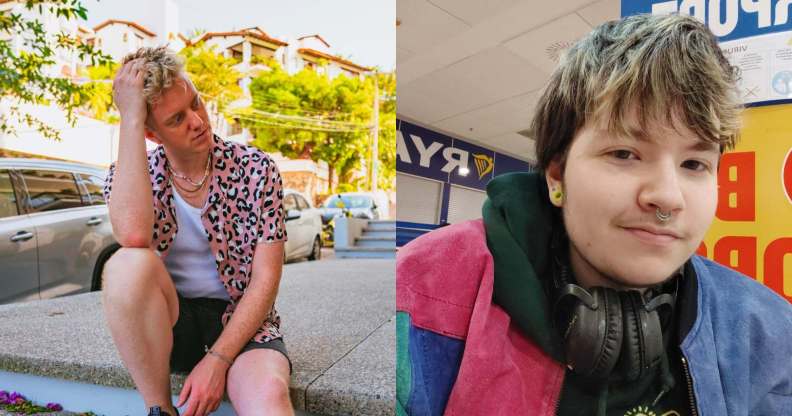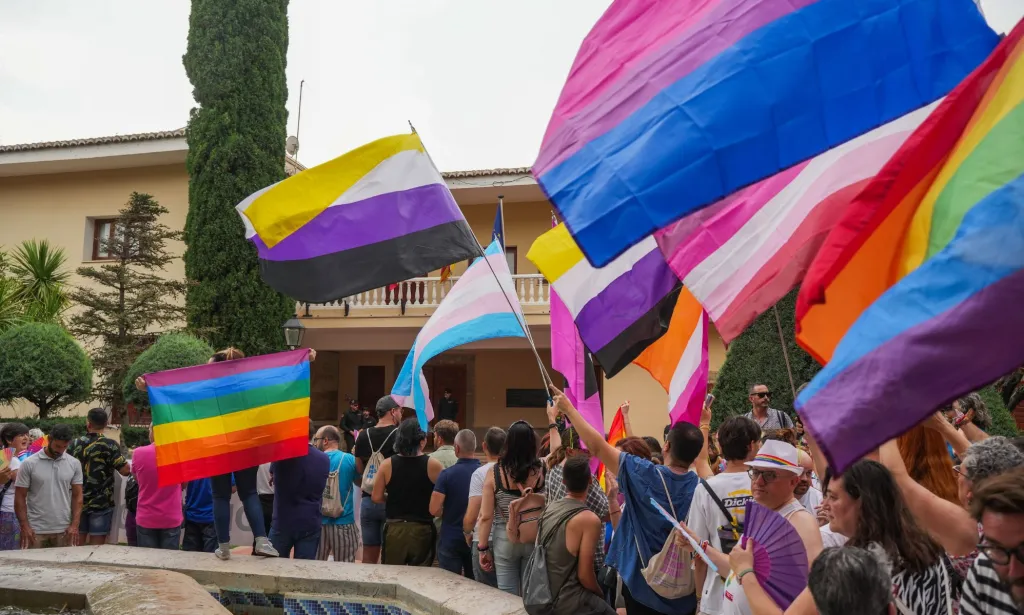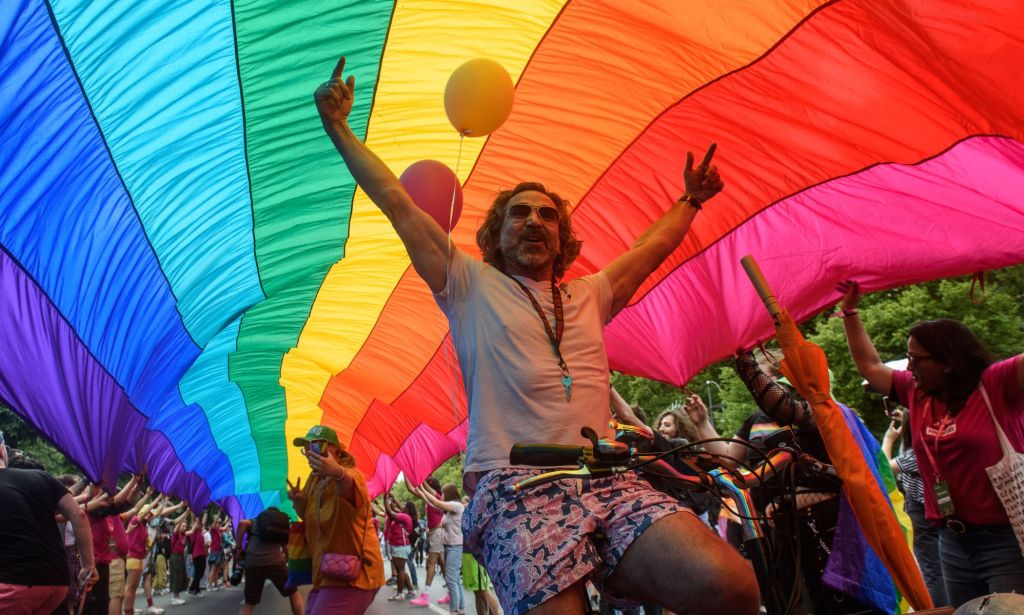How queer people are hiding their identity in public as anti-LGBTQ+ sentiment grows

James Barr (L), a comedian and podcast host, and Micah Neilson (R), a trans queer person, explain how they change the way they present themselves out of fear of violence. (Supplied)
When comedian James Barr heard about the stabbing at The Two Brewers in Clapham, London, he was reminded of a fact he’s known for some time: queer people are still not safe in public.
Like most queer people, James has spent much of his life trying to stay safe in a society where open hostility and violence against the LGBTQ+ community is still an everyday reality. As news broke earlier this week of The Two Brewers stabbing – which left two men hospitalised with non-life threatening injuries – James was reminded of all the times he’s changed the way he dresses or amended his behaviour to stay safe.
He’s not alone.
For as long as LGBTQ+ people have existed openly, they’ve had to navigate times when they might need to temporarily retreat back into the closet. On dark street corners, on public transport, and even at work, queer people still alter how they present themselves to the world because they know that the threat of hate crime and violence is ever-present.
Speaking to PinkNews, James – who also hosts the A Gay and A NonGay podcast – says he “regularly” comes up with ways of disguising himself in public to avoid unwanted attention. Shortly after The Two Brewers stabbing, he shared a picture of himself on Twitter which showed him wearing a lime green coat over a pink jacket on a train.
He tweeted: “Someone asked me why I’m wearing two coats tonight, I lied and said it might rain – really it’s because I’m terrified that the pink jacket might draw unnecessary attention and I don’t feel safe.”
James admits that he’s “often concerned” about what he’s wearing once he finds himself in public alone.
“If I’m going to do stand-up I’ll always wear something really bright but then I’m like, ‘Oh, I’m walking through the streets and it’s dark so I better wear something that I can cover it up with.’
“It even comes down to rainbow socks. I’ll be really nervous to put rainbow socks on. I don’t even know why. You just think, I don’t want to give someone an excuse.”
James also regularly gets his nails done, but he worries overt displays of queerness such as this will put a target on his back when he’s alone on public transport. He says he often keeps his hands in his pockets while on the bus, and he always has a back-up plan of what he would say to a potential attacker.
“Do you know what I always do actually? I’ve never said this out loud before – I think I always have this back up line in my head of like, ‘Oh no, my girlfriend likes it.’ How ridiculous.”
James never feels totally safe in public, but he feels safer in queer spaces. He recently went to Pride wearing hot pants and a vest – an outfit that wouldn’t attract too much attention in a sea of queer people – but he worried about what could happen while he was getting there. He ended up getting a taxi to his local Tube station instead of walking, out of fear that his outfit would make him a target.
Abuse and violence are still common for those who are visibly queer
Laurence, whose name has been changed, echoes these fears.
He tells PinkNews that he used to regularly go out wearing six-inch platform shoes and bright, colourful flares with a “gaudy blouse or big-collared ‘70s shirt” all the time. He always made an effort to dress as loudly as possible, and much of what he wore was womenswear.

But not anymore. These days, Laurence tries to keep his fashion sense a bit more dialled down to avoid attracting “the wrong kind of attention”. Like James, he carries a coat with him to hide his outfit when he feels like he needs to camouflage himself.
That shift can be traced back to a traumatic incident that happened when Laurence was travelling home after having a picnic with friends. He was tipsy and was wearing a multicoloured bead necklace with an “otherwise simple outfit”.
“It was just me and this guy on the train platform and he’s shouting down the phone at someone, and I look over at him as I’m about to get on the train and he starts shouting and screaming at me calling me a f****t and asking why I’m staring at him.”
Laurence jumped on a train to get away from the man and walked down through the carriages until he found another passenger. He told them he was scared and that a man was following him.
Shortly afterwards, the man walked into the carriage and sat across from Laurence and the other passenger.
“He’s still on the phone and he pulls out a small knife and is telling the person on the phone he is sat in front of a ’t****y f****t’ and starts talking about the necklace I’m wearing saying that ‘f****ts always have their rainbow s**t and starts telling me I’ll never be a man no matter how hard I try.
“I go to get up the next stop and he holds the knife out and says to sit down.”

Laurence recalls how “lost and scared” he felt in the moment. When the train got to Clapham Junction he jumped up, ran up the stairs until he tripped and fell. He sat there sobbing and called his mum, asking her to collect him.
Laurence’s mum urged him to report the incident to police, but he didn’t want to as he has “never had a good experience reporting crimes”.
“I mostly stopped wearing jewellery after that,” Laurence says. “I did get my ears pierced about a year later but I rarely change out of my studs because I don’t want to look like I’m trying to be a woman in case it draws negative attention.”
The situation is the same outside of the UK. In Ireland, Micah Neilson says he’s had to tone down how he presents himself after he was targeted.
“There were two incidents within the past year where coins have been thrown directly at me as well as being verbally harassed that have made me feel less safe,” Micah tells PinkNews.
“Both of these incidents happened in Limerick and it has changed the way I present myself in the city in the evenings. It has definitely encouraged me to wear different, more ‘normal’ clothing in certain areas or on public transport in case of harassment.”
He usually feels “fairly safe” in cities, and dresses however he wants, but he admits that he’s less visibly queer these days due to recent transphobic attacks.
“In recent years I’ve felt that my safety is definitely threatened,” he says.
Anyone who has witnessed or experienced a hate crime is urged to call the police on 101, Crimestoppers anonymously on 0800 555 111 or visit the True Vision website. In an emergency, always dial 999.
How did this story make you feel?

